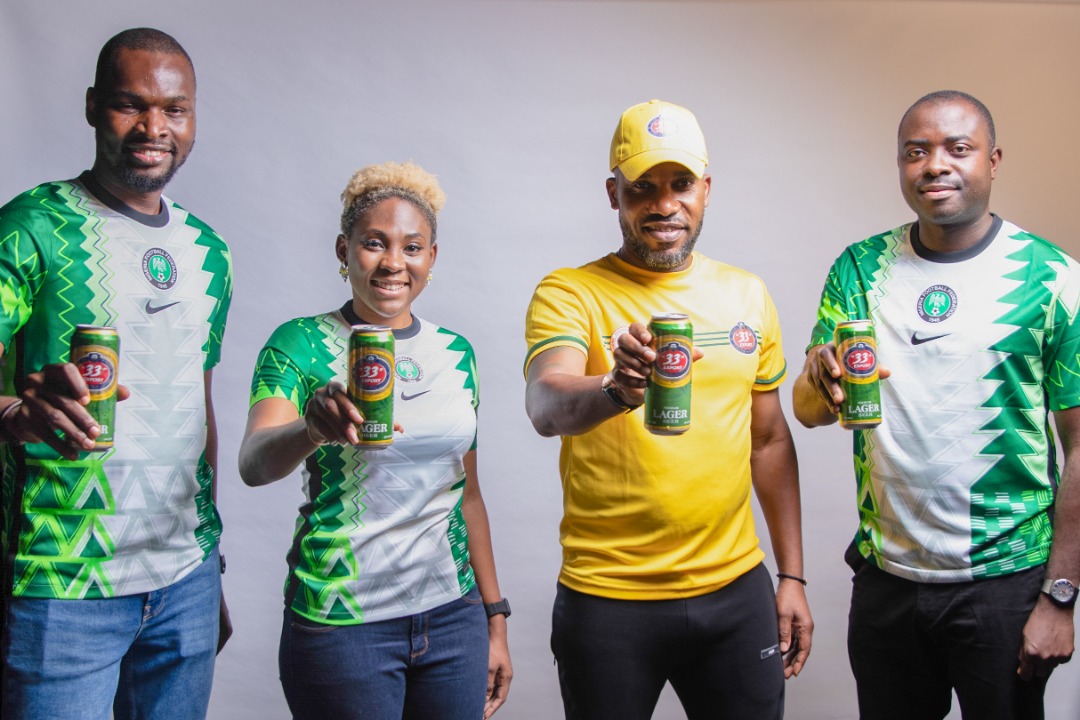Broadcasting
Okocha Becomes “33” Export Ambassador

It is an exciting period for football lovers in the country as the African Cup of Nations (AFCON) 2021, kicks off in Cameroon today after it was postponed in 2021. One more reason for true fans of the game to be excited is the signing of Nigerian football legend and former Super Eagles Captain Austin “Jay Jay” Okocha as brand ambassador for “33” Export Lager Beer.

L-R: Rex Anthony Anieke; Brand Manager, “33” Export Lager; Aishat Anaekwe, Senior Brand Manager, “33” Export Lager; Austin Okocha, Brand Ambassador, “33” Export Lager; Funsho Ayeni, National Trade Marketing Manager, Nigerian Breweries Plc; during the official unveiling of Austin “Jay Jay” Okocha as the brand ambassador for “33” Export Lager Beer In Lagos, Recently.
The midfield maestro is arguably one of the most loved sports heroes in the country and brought joy to many homes during his time as an active footballer with his exciting style of play.
As the official beer partner of the Nigerian Football Federation (NFF), “33” Export has been drumming up support for the Super Eagles ahead of the AFCON tournament and this move is in line with that.
Commenting on the signing, Aishat Anaekwe, Senior Brand Manager, “33” Export Lager, said “we are excited that Jay Jay Okocha is joining us as a Brand Ambassador just before the AFCON and going into a football year. We know how much Nigerians love football and their footballers and we want this to add to the excitement of the tournament. Celebrating past heroes is also one way to encourage the present squad to go for glory and we believe this signing would truly inspire them.”
The Super Eagles of Nigeria find themselves in Group D where they will face seven-time winners of the tournament, the Pharaohs of Egypt and in-form striker Mohammed Salah. The Desert Hawks of Sudan are no pushover themselves having won the tournament once in the past and coming into this one quite strong. The Eagles have never met the Djurtus of Guinea Bissau at the international level and hopefully, there are no unpleasant surprises.
After a painful loss at the semi-finals of the 2019 AFCON via a Riyad Mahrez freekick in the final minutes of the game, the Super Eagles went on to win the third-place match against Tunisia. This time around, the Super Eagles are one of the favourites to lift the trophy and the veteran has backed them to have a decent showing this time around. In his words,
“I believe we have a decent squad that should have a great outing at the tournament. We alone are the obstacles we need to overcome. With the right support from the fans and partners like “33”, everything is possible. We really can be super together.”
Broadcasting
DStv Revenue Plunges as MultiChoice Loses Nearly 4m Subscribers

MultiChoice, Africa’s leading entertainment provider and operator DStv, has warned shareholders to brace for tougher times as the company struggles in a challenging economic climate.

MultiChoice has seen its DStv subscribers decline from over 23 million to 19.3 million in less than two years.
A huge portion of the subscriber loss happened outside its home of South Africa.
In an earlier statement, MultiChoice attributed the steep decline to economic pressures in key markets, particularly Nigeria.
“The loss in the rest of Africa has been primarily due to the significant consumer pressure in Nigeria, where inflation has remained above 30% for the majority of the last 12 months and, more recently, due to extreme power disruptions in Zambia,” the company said.
The company’s latest voluntary operational update, released in preparation for its financial results for the year ending March 31, 2025, reinforces the severity of its current challenges.
MultiChoice noted that the “challenging consumer environment has resulted in a decline in subscribers and limited revenue growth,” underscoring the financial strain faced by the company.
This development came amid increasing regulatory scrutiny, with Nigeria’s Federal Competition and Consumer Protection Commission (FCCPC) recently filing charges against MultiChoice for allegedly violating local regulatory directives.
Broadcasting
Court Fixes May 8 for Judgment in MultiChoice, FCCPC Dispute over Price Hike

Justice James Omotosho of the Federal High Court in Abuja has fixed May 8 for judgment in the suit filed by MultiChoice Nigeria Limited against the Federal Competition and Consumer Protection Commission (FCCPC).

Justice Omotosho fixed the date after lawyers representing the parties adopted and argued their written addresses for and against the suit.
The court had earlier restrained the Commission from taking “any administrative steps” against the plaintiff following an increase in the service price of two of its brands; DStv and GOtv.
The restraining order was a sequel to a formal request by MultiChoice seeking the court’s protection from planned sanction from the FCCPC, over the increase in the price of DStv and GOtv.
At the proceeding, the court granted the Commission’s request for an extension of time to regularise its processes and also allowed the plaintiff to withdraw its application for interlocutory injunction which has been overtaken by event.
Arguing its case, MultiChoice through Moyosore Onigbanjo, SAN, its lead counsel, submitted that the bone of contention is “whether the defendant have the right to control the price at which the plaintiff offers its services to the public.”
While acknowledging the regulatory powers of the Commission, the senior lawyer argued that the Act establishing the FCCPC did not confer on it the powers to regulate price or prevent anyone including the plaintiff from increasing its prices.
Besides, Onigbanjo stated that the issue of whether the defendant can regulate price has been litigated before between the two parties, adding that the Tribunal had held that the Commission has no powers to regulate prices of goods and services in the country, except the President of the Federal Republic of Nigeria.
The Plaintiff’s lawyer also submitted that even the president who is clothed with the powers to regulate prices has maintained “that his government does not believe in price control” but, that prices are determined by market forces of demands and supplies.
The plaintiff in addition submitted that if the FCCPC has no powers to control price “where does he have the powers to prevent the plaintiff from increasing price.
MultiChoice subsequently accused the Commission of discrimination, stating that all businesses in the country have been increasing their prices in line with economic conditions and inflation without the Commission raising an eyebrow, save with the plaintiff.
He, therefore, urged the court to grant all the reliefs sought in the suit.
While adopting his counter affidavit in opposition to the suit, Professor Joe Agbugu, SAN, lead counsel for the defendant, urged the court to first address the cause of action; which is the the issue of increase in the price of DStv and GOtv.
Agbugu disclosed that the Commission on February 25, wrote the plaintiff after it announced price increase effective from March 1, 2025.
According to the senior lawyer, MultiChoice was summoned to appear before the Commission on February 27, “they wrote that it was not convenient and proposed March 6. We then said that in the interim they should hold on with the price increment.”
Agbugu further stated that, “there was no issue of price regulation or fixing as at the time the action commenced.”
Besides, he claimed that the statute establishing the FCCPC, gave it “powers to check exorbitant pricing” and also powers to “regulate abuse of dominant position in the market” as it relates to prices and passing of cost to the consumer.
“The plaintiff occupies a dominant position in the television and entertainment,” Agbugu claimed, adding that the case before the court is not of price regulation but the powers of the Commission to investigate prices that are deemed exploitative and abuse of dominant position.
“The Commission is not to tell you to use price A or B but to determine that the price is exploitative” he said, “they ran away to be investigated over their planned action.
“Our action is not about price fixing; the issue is about whether the price is exorbitant…the mandate of the Commission is to protect the consumer.”
Reacting to the claim of discrimination, defendant’s lawyer, submitted that, “abuse of dominant position qualified them to be singled out for exorbitant pricing.”
Agbugu subsequently urged the court to strike out the suit and dismiss it because it attacks the major task of the Commission of protecting consumers.
“The suit should be dismissed and the plaintiff returned to us for investigation,” he added.
Responding, Justice Omotosho announced that, “judgment is reserved to May 8.”
Broadcasting
From Struggle to Stability: How FinTech is Helping Nigerian SMEs Overcome Cash Flow Challenges

When Mrs. Agbaje started her school in Ibadan twelve years ago, she didn’t envision a tech-enabled future. Her dream was simple—provide affordable, quality education to children in her community. For the most part, she made it work. But as the school grew, a new challenge took root. It wasn’t infrastructure. It wasn’t teacher retention. It was something far more basic: getting paid.

Each new term brings the same pattern. Parents promise to pay fees “by next week.” Some follow through. Many don’t. As the term wears on, Mrs. Agbaje finds herself juggling spreadsheets, reminder texts, and awkward conversations in car parks or at school gates. Meanwhile, salaries must be paid, books restocked, diesel bought. More often than not, she dips into personal savings to keep things running.
Her story is common across Nigeria. Small businesses—whether they’re schools, salons, logistics firms, or cooperative groups—are constantly navigating the emotional and financial toll of delayed payments. And it’s not just a matter of inconvenience. A recent study by MacTay Consulting found that Nigerian SMEs wait between 60 to 120 days on average to receive payment for services or products already delivered. That kind of delay is more than a hiccup. It threatens livelihoods. It blocks growth. It’s a silent killer.
For Chuks, who runs a car hire service in Enugu, the issue is tied to his bigger corporate clients. They insist on “net 30” or “net 60” terms—industry-speak for “we’ll pay you in a month or two.” That might be manageable for a large fleet with strong cash reserves, but for someone like Chuks, every week matters. With fuel prices rising and maintenance bills stacking up, he’s often forced to park cars because he doesn’t have the cash to fix them—even when work is lined up.
What links these stories is the reality that small businesses operate in a system where money is constantly in motion but rarely on time. Customers often mean well, but their own financial instability creates a domino effect. And the existing tools to manage payments—handwritten ledgers, POS machines, WhatsApp reminders—were never designed for structure. They’re patched solutions to a systemic problem.
Even digital banking, for all its advancement in Nigeria, hasn’t solved this issue. Many SMEs still operate informally, managing finances through personal bank accounts or apps not tailored to business needs. The result is a messy web of follow-ups, reconciliations, and emotional strain. Business owners become debt collectors, chasing down what they’ve already earned, time and time again.
What’s often missed in conversations about entrepreneurship is just how deeply this problem cuts. Payment delays mean rent can’t be paid on time. It means holding off on hiring a new staff member, or letting go of a part-time assistant. It means saying no to growth opportunities, not because they’re not viable, but because the cash flow isn’t predictable enough to take the risk.
And when you zoom out, the implications are national. Small businesses make up over 90% of enterprises in Nigeria. They contribute nearly half of the country’s GDP and employ a significant portion of the workforce. Yet, their greatest enemy isn’t market competition—it’s irregular income. This is a structural inefficiency that deserves far more attention than it gets.
Slowly, however, change is beginning to show. A quiet revolution is underway—one where technology is stepping in not as a trend, but as a tool for financial stability. More SMEs are beginning to explore digital solutions that streamline payments and reduce friction between businesses and customers.
Among these solutions is PaywithAccount, a new tool launched by Nigerian fintech company OnePipe. Designed specifically for businesses with recurring payments—schools, cooperatives, service providers—it allows them to automate collections directly from customers’ bank accounts. With full consent and transparency, payments can be scheduled, reducing the need for repeated follow-ups or awkward reminders.
For Mrs. Agbaje, this has made a significant difference. Parents receive structured payment plans, reminders go out automatically, and debits happen based on prior agreement. She now spends less time tracking who has paid and more time planning curriculum upgrades and engaging with teachers.
The benefit isn’t just financial—it’s emotional. When business owners don’t have to chase payments, they gain time, clarity, and confidence. They can plan ahead, restock inventory, or finally invest in that expansion they’ve put off for years. And for customers, the experience feels more professional, more trustworthy. Everyone wins.
Technology won’t solve every problem for Nigerian SMEs. But smart, well-designed financial tools are starting to remove some of the biggest roadblocks—quietly and effectively. And that’s the point. The best systems aren’t flashy. They work in the background, reducing stress, restoring dignity, and enabling business owners to focus on what truly matters.
For Ope Adeoye, founder of OnePipe, the issue is personal. “Every Nigerian knows someone who runs a business—a cousin, a friend, a neighbour. When they suffer from late payments, it affects whole families and communities. Fixing this isn’t just a business goal—it’s a social one.”
In a country as dynamic and entrepreneurial as Nigeria, the challenge is rarely about lack of ideas. It’s about systems that help those ideas survive. And one of the most overlooked systems is the way money flows—or fails to.
As more SMEs embrace tools that put payment on autopilot, a future of stability—rather than constant survival—starts to feel possible. And in a nation powered by small businesses, that kind of shift could move mountains.

 Telecom2 days ago
Telecom2 days agoMTN, Lynk Global Make Africa’s First Satellite-to-Mobile Call

 E-Business2 days ago
E-Business2 days agoSystemSpecs’s Subsidiary Deelaa Becomes Whatadeal

 E-Financial2 days ago
E-Financial2 days agoNigeria Gets Fresh $500m World Bank Loan for Economic Stimulus Programme

 General News2 days ago
General News2 days agoSERAP Asks National Assembly to Drop Bill to Jail Nigerians who Fail to Vote

 E-Financial2 days ago
E-Financial2 days agoUninsured Depositors of Heritage Bank to Receive Liquidation Dividends In April – NDIC

 Telecom2 days ago
Telecom2 days agoSmart Treasure Investment Team’s Initiatives Eradicate Poverty, Says Aminu

 E-Business2 days ago
E-Business2 days agoCybersecurity Firm Says It’s Time to Back it Up, As the World Marks World Backup Day

 General News2 days ago
General News2 days agoFG to Elevate Enugu Tech Festival to National Event – Minister



























